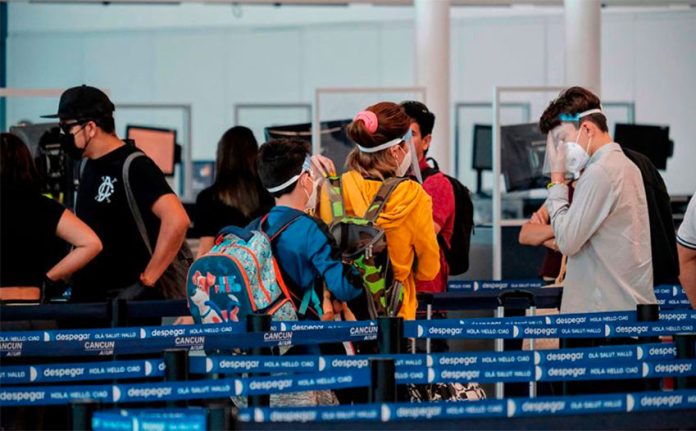Almost 70,000 tourists have visited Cancún since the Caribbean coast resort city reopened for tourism almost a month ago but hotel occupancy levels remain low.
Municipal tourism official Francisco López said that approximately 13,000 visitors are currently staying at the 120 hotels that have reopened at 30% capacity since June 8, the date from which tourism activities were allowed to resume despite the coronavirus pandemic.
He said that tourist numbers are expected to grow as air connectivity to Cancún increases and more hotels open. López said that there is confidence that occupancy levels can rise to 50% in the second half of the year.
The Hotel Association of Cancún, Puerto Morelos and Isla Mujeres (AHCPM) said the average occupancy rate over the past month in the approximately 6,500 hotel rooms currently open has been less than 20%.
In addition to the more than 14,000 rooms currently closed in the hotels that have resumed operations, 74 hotels with more than 17,600 rooms have not yet welcomed back guests.
The AHCPM said in a statement that all the hotels that have reopened are following strict health and hygiene protocols to protect both guests and their employees from the risk of coronavirus infection.
While flights to Cancún from both domestic and international destinations are still below pre-pandemic levels, air traffic at the city’s airport has recently increased.
About 150 flights landed and took off on both Saturday and Sunday, airport authorities said. Among the international destinations with connections to Cancún are the U.S. cities of Fort Lauderdale, Los Angeles, Denver, Salt Lake City, Chicago, Baltimore, Charlotte, New York, Miami, Atlanta, Houston and Dallas, and Montreal, Canada.
Unlike many other countries, Mexico hasn’t restricted the arrival of airline passengers during the pandemic nor has it stipulated that they go into mandatory quarantine.
Tourists who have recently flown into Cancún to stay at hotels have been able to access the city’s famous beaches but local residents are currently being denied entry though the coastline is public, according to the Mexican constitution.
AHCPM president Roberto Cintrón Gómez defended the move to open beaches only to tourists on the grounds that it is only a temporary measure and one that is needed to decrease the risk of coronavirus infection.
“We’ve fought so that visitors can have access to the beaches, with certain restrictions. … The few tourists [in Cancún] are taking a risk by going on vacation but they come for the beach and we must keep that in mind,” he said.
Less happy about the tourist-only access to beaches is President López Obrador, who said that he would ask Tourism Minister Miguel Torruco to seek clarification about why the general public was being denied entry.
Quintana Roo, the state where Cancún is located, has recorded 4,245 confirmed coronavirus cases, of which 806 are considered active, according to federal government data.
More than half of the state’s cases – 2,404 – were detected in the municipality of Benito Juárez (Cancún), while neighboring Solidaridad, home to Playa del Carmen, has recorded 617.
Tulum, another popular tourist destination in Quintana Roo, has recorded just 70 confirmed cases since the beginning of the pandemic.
Source: El Economista (sp)
